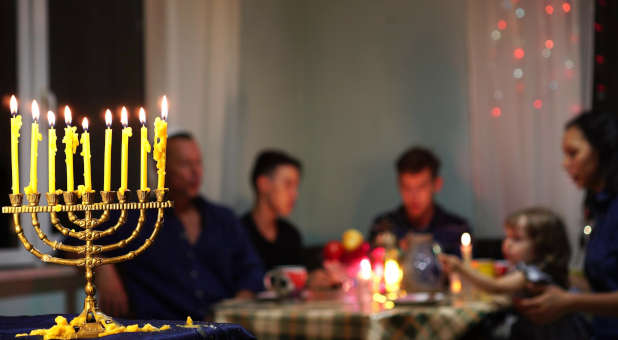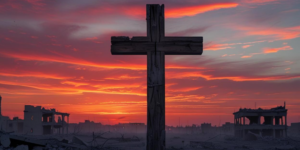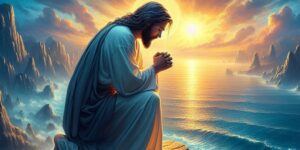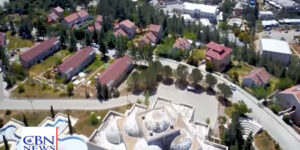Hanukkah, a Celebration of Light Over Darkness and a Surprising Military Victory
As Israel enters into a third month of war, it finds itself in a prophetically saturated situation.
Hundreds of scripture passages—from the Torah to the Psalms and the Prophets—seem to be speaking explicitly about the current situation of Israel’s war against the Hamas terror group.
Whether Psalm 64, which speaks of enemies who “shoot from concealed places at the innocent” and “hold fast to their evil purpose,” or Solomon’s prayer to God in 1 Kings 8, where he mentions those taken “captive into the land of the enemy,” hundreds of passages suddenly become real in an unsettling way.
In some ways, it might even seem inappropriate to celebrate while the nation as a whole is still grieving.
And yet, the celebration of Hanukkah reminds us that exactly when the situation seems darkest, that is when the light must shine.
So what is Hanukkah, and why is it so appropriate for Israel’s current situation?
Hanukkah commemorates the victory of a priestly family, known as the Maccabees and later the Hasmoneans, against Seleucid Greek rulers from Syria about 165 years before the birth of Yeshua (Jesus).
The name Maccabee is said to come from the phrase in Exodus 15:11, “Who is like you among the gods?” (Mi kamocha ba’elim Adonai? – מי כמוך באלים יהוה)
The Greeks had ruled the land of Israel since Alexander the Great’s defeat of the Persians in 329 B.C. However, one of the Seleucid rulers Antiochus IV, despite initially being friendly to the Jews of Judea, decided he needed to unify his kingdom politically, culturally, and religiously to resist attempts by the Ptolemy family in Egypt to steal the loyalty of his citizens.
Antiochus instituted a series of laws meant to unify his kingdom, which included the forbidding of Jewish practice and the institution of Greek-influenced eastern religious practices.
For over a thousand years, people in the Ancient Near East worshipped their rulers as “sons of god”, or avatars of gods. Antiochus declared himself to be an appearance of the god Zeus, thus the name Epiphanes, and set up an altar to Zeus in the Temple of Jerusalem with his face.
He also sent Seleucid Greek and Syrian soldiers into Judea to enforce his new regulations.
Thus, the Hanukkah story starts with an invasion of the territory of the Jews.
Because the Seleucid Greeks quickly gained control of Jerusalem and profaned the Temple, the faithful Jewish people were unable to celebrate the biblical festival of Sukkot, which contains the celebration of Shemini Atzeret, the eight-day assembly at the end of Sukkot.
Thus, the Hanukkah story contains a profane of the Sukkot holiday.
Antiochus’ desire to impose a unified identity on his kingdom meant an erasing of the distinctive Jewish identity of those living in Judea. While he was not inherently antisemitic, his desire to impose a common Greek identity was, nevertheless, an attack on the Jewish identity of those living in the land. Antiochus’ campaign would have led to the end of an identifiable Jewish presence in the land.
The Hanukkah story represents a threat to the Jewish presence in the Land.
When the Greeks profaned the Temple by setting up an Ido of Zeus and sacrificing unclean animals on the altar, the Temple and the city of Jerusalem were rendered both ritually and, due to the battle to retake them, physically unclean. The books of 1 and 2 Maccabees, part of the Jewish Apocrypha, record the ruinous state after the Jewish armies retook Jerusalem.
Purifying the Temple for rededication meant rebuilding and cleaning out the remains of death and destruction. While Israel finds itself physically taking that action with the horrific remains of the barbaric attacks from Oct. 7, the nation is also beginning to understand that it has made idols of the Israel Defense Forces and the security apparatus.
The very name of Hanukkah means ‘Dedication’ and describes the purifying and rededication of the Temple. For the second time since returning from the Babylonian Exile, the Jews found themselves rededicating the Temple.
The priests, along with Judah Maccabee, were faced with a dilemma as they did their work. The Torah clearly states that the altar of sacrifice is holy, yet the Greeks had profaned it by sacrificing a pig on the altar.
The Torah does not instruct the re-purification of the Altar, so the priests took the stones of the altar and kept them in a separate place until a prophet would arise and tell them what to do with them (1 Maccabees 4:41-47).
Almost 200 years later, Yeshua would purify the uncleanness of the world, allowing murderers, adulterers and idolaters to become living stones in a new Temple, dedicated to the true worship of the Father, as we read in 1 Peter, chapter 2:
And you are living stones that God is building into his spiritual temple. What’s more, you are his holy priests. Through the mediation of Jesus Christ, you offer spiritual sacrifices that please God. 6 As the Scriptures say, “I am placing a cornerstone in Jerusalem, chosen for great honor, and anyone who trusts in him will never be disgraced” 1 Peter 2:5-6.
The Jewish historian Josephus called Hanukkah the Feast of Lights. He is the only ancient author to do so.
He associates the name, not with a legend of oil lasting eight days, or even with the lighting of the Temple menorah, but rather with the freedom to worship God that the Jews had recovered.
As Yeshua himself said, “In the same way, let your light so shine before men that they may see your good deeds and give glory to your Father who is in heaven.”
This year, as the Jewish people face intense persecution which began with the satanic attack on the land of Israel, perhaps you, too, would consider lighting a Hanukkiah, the Hanukkah menorah, to let the Jewish people know they do not stand alone.{eoa}
This article originally appeared on ALL ISRAEL NEWS, and is posted with permission.
Join Charisma Magazine Online to follow everything the Holy Spirit is doing around the world!
J. Micah Hancock is a current Master’s student at the Hebrew University, pursuing a degree in Jewish History. Previously, he studied Biblical studies and journalism in his B.A. in the United States. He joined All Israel News as a reporter in 2022, and currently lives near Jerusalem with his wife and children.







































